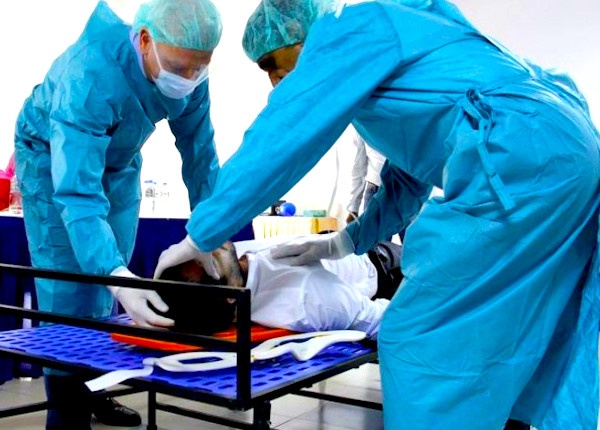
Bangladesh during COVID-19 has to think about displaced people escaping violence in Myanmar
Hundreds of thousands of people, displaced by violence in Myanmar, live in crowded refugee camps in Bangladesh. It is a precarious existence at the best of times; when so many people live so close together, the disease can spread easily. Now, with COVID-19, there is a new, and potentially deadly threat.
Violence in Myanmar does not stop during COVID-19 outbreak. Now, Bangladesh has to consider thousands of displaced people on its territory. This is what the ICRC reports. Now ICRC is supporting the population in order to prevent the spread of coronavirus.
Bangladesh tries to control COVID-19 spread but has to take care of displaced people from Myanmar
Konarpara camp, on the Bangladesh/Myanmar border, is a no man’s land housing 620 displaced families from Rakhine state. They have already fled their homes, their living conditions are precarious, up to ten people in makeshift plastic shelters, sharing toilets. Now the monsoon season is approaching.
The tried and tested ways to control the spread of Covid-19, physical distancing, and hygiene, are difficult to achieve in this environment. But the ICRC, the only international aid agency with access to Konarpara, is already working on it.
A new strategy for food distribution, designed to ensure everyone gets what they need, but no one gets too close, is underway.
“We have split the distribution dates,” explains ICRC delegate Berthe Diomande. “Before we were distributing to 600 people all in one day.”
“Now we have three days of distribution to avoid gathering too many people at the same time. And they will come and stand in line according to social distancing. We already marked the places where they should stand to maintain social distancing.”
ICRC with Bangladesh Red Cross in order to help the population against COVID-19
The ICRC, together with the Bangladesh Red Crescent, is also helping the families in Konarpara to maintain good hand hygiene, with special hand washing lessons even for the youngest. Before getting food, everyone washes their hands.
Access to health services is more important than ever. The ICRC’s mobile health clinic visits Kornarpara twice a week, to check for Covid-19 symptoms, and, as ever, to provide basic health care. Anwara Begam knows the clinic well and went straight there when her son became ill.
“My baby has a cough,” she says. “He’s had a cold, and been coughing all night for a few days now.”
“Whenever we are ill we come here,” she continues. “We come and wait for the doctor. We don’t go anywhere else for treatment.”
COVID-19 is not the only disease in Bangladesh
The medical team have been operating right from the moment the displaced arrived from Myanmar, and have tackled vector-borne diseases like dengue, and fast bacterial infection such as cholera and diphtheria.
“Health care is a basic need, and fundamental to everyone,” says Dr Dishad Chandra Sarker. “Children under 5 are especially vulnerable. They come here with diarrhea or asthma, and if we don’t treat them they could die.”
But working within the context of Covid-19 presents special challenges, especially given the living conditions in Konarpara camp, and the limited health infrastructure across Bangladesh.
“The whole world is facing a shortage of PPE (personal protective equipment),” explains Dr Sarker. “We are trying to get it as well. It is our job to treat everyone who needs health care, we are doing that, but we should not have to make compromises about PPE.”
So far, no case of Covid-19 has been reported in Konarpara. Hopefully, with the new hygiene and distancing strategies, and the vigilance of the medical team, it will stay that way.
READ ALSO
Resilience in Bangladesh: Floating schools as solution against monsoon and flooding
COVID-19 in Asia, the ICRC support in congested jails of the Philippines, Cambodia and Bangladesh
British Army support during the COVID-19 pandemic
University of Yucatan underlines the importance to “think positive” during COVID-19 pandemic
Cuba sends 200 medics and nurses to South Africa to face COVID-19


